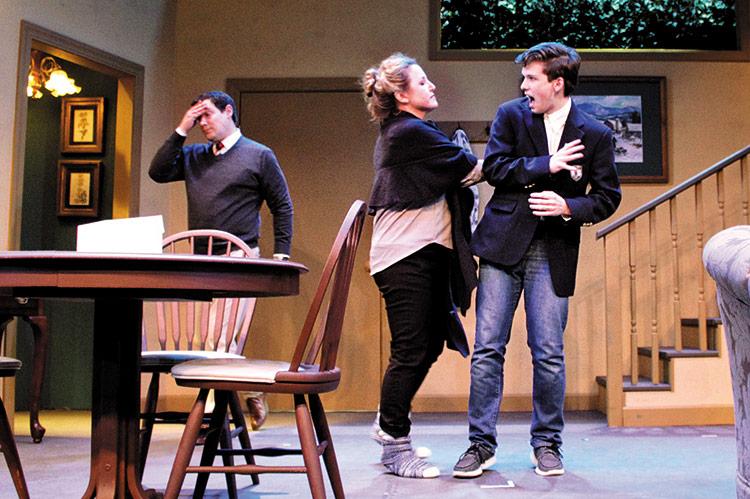Do white liberals hate themselves? Are quota systems fair, or even logical? How dark must your skin be to be considered a “person of color”? These are just some of the questions raised by “Admissions,” a satire about education and diversity now in revival by the Hampton Theatre Company in Quogue.
“Admissions” is a kind of companion piece to “Safe Space,” another satire about student life, which was produced so successfully last summer at Bay Street Theater in Sag Harbor. “Admissions” is less searing than “Safe Space,” though the satire is no less biting. Joshua Harmon, the playwright, takes us to a brave new world where parents, children, and faculty are obliged to navigate the often confusing, often flawed — and sometimes downright illogical — climate of enforced liberal diversity.
The setting is Hillcrest, an elite preparatory school in New Hampshire. (All the characters in “Admissions,” it needs to be said, are white.) Sherri, the director of admissions (Morgan Vaughan), is hell-bent on making Hillcrest less white. Proudly, and precisely, she tracks the rise in the percentage of minority students during her tenure. When she hits 20 percent, her equally “woke” husband, Bill (Tristan Vaughan), who also works at the school, brings home a bottle of wine to celebrate. Sherri’s friend Ginnie, who is married to an African-American, also decries how white Hillcrest is and praises Sherri for her work.
If this sounds a little self-righteous, it’s because it is. Minerva Perez is especially adept at embodying Ginnie’s aura of sanctimony. Though it’s never stated, her character’s subtext is that being married to a black man gives her a moral superiority, and thanks to Ms. Perez, Ginnie’s piety is almost unbearable to watch.
Enter Charlie, Sherri and Bill’s son. He has just been deferred by Yale, though his grades and SATs more than exceed the requirements. Distraught that Ginnie’s half-black son, Perry, has been accepted at Yale with lesser scores, Charlie delivers a blistering monologue on the stupidities of diversity-mania. As Charlie, Ian Hubbard (a senior at Hampton Bays High School) delivers a show-stealing performance, capped by this 15-minute soliloquy in which the character eviscerates racial talking points one by one, finally ending with a shocking “Sieg Heil” salute.
Ugly as this is, we know Charlie doesn’t really mean it, first because he is half Jewish, and because we already know he is far too intelligent to engage in hateful gestures without irony. Rather it is a symbol of his exasperation — at having been rejected by Yale for being in the wrong racial pool, at having to endure the culture’s constant insults of being, yuck, a white male.
Of course, good satire always bites its own tail, and “Admissions” certainly does that. After his speech, Charlie is excoriated by his father for being a spoiled, privileged brat (another irony). A few days later, he confronts his mother in the admissions office. Charlie has had a change of heart. Upon reflection, he argues — quite convincingly — that there are plenty of undeserving white kids at Hillcrest as well, subpar students of wealthy parents who have given endowments to the school, for example, or are admitted for reasons of “legacy,” among other unfair advantages. Quota systems are useful, he concludes.
Sherri seems pleased until Charlie comes up with a scheme to follow his parents’ ideals to their logical conclusion, putting his own college career in jeopardy in the name of diversity. His parents hit the roof, of course, and their own hypocrisy is laid bare.
The director, Andrew Botsford, wisely asks his cast to completely buy in on their characters’ smugness, even at the risk of being unlikable. And as usual with this company, the performances are uniformly strong.
Diana Marbury has an especially nice turn as Roberta, the photographer for the school catalog, who is upbraided by Sherri for not taking enough pictures of “easily identifiable” minority students. “You mean more dark-skinned?” Roberta frankly asks, and is told no, though that is exactly what she is being asked to do. Roberta is the kind of “boomer” who was always on the right side of racial issues, but never thought much about it until it was foisted on her by people like Sherri.
There are numerous set changes in “Admissions.” This is, of course, dictated by Mr. Harmon’s text. But in this production the changes can take what seems like several minutes, and this can sometimes sacrifice valuable momentum as the audience sits waiting patiently in the dark for the next scene.
But there’s no spoiling what is otherwise a top-notch production of a timely drama. In “Admissions,” Mr. Harmon takes aim not at diversity itself, but rather the sanctimony of its proponents, who cower under the shadow of white guilt and then strut their “wokeness” like a badge of honor.
It’s a target so big he almost couldn’t miss.




